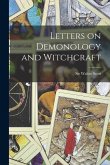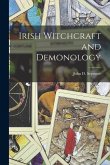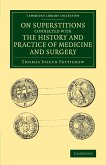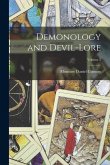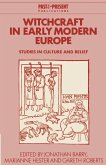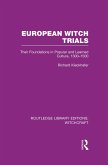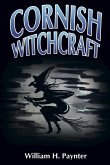- Broschiertes Buch
- Merkliste
- Auf die Merkliste
- Bewerten Bewerten
- Teilen
- Produkt teilen
- Produkterinnerung
- Produkterinnerung
Author Sir Walter Scott's investigations into the rational explanations behind stories of witchcraft and magic, first published in 1830.
Andere Kunden interessierten sich auch für
![Letters on Demonology and Witchcraft Letters on Demonology and Witchcraft]() Walter ScottLetters on Demonology and Witchcraft26,99 €
Walter ScottLetters on Demonology and Witchcraft26,99 €![Irish Witchcraft and Demonology Irish Witchcraft and Demonology]() John D. SeymoreIrish Witchcraft and Demonology19,99 €
John D. SeymoreIrish Witchcraft and Demonology19,99 €![On Superstitions Connected with the History and Practice of Medicine and Surgery On Superstitions Connected with the History and Practice of Medicine and Surgery]() Thomas Joseph PettigrewOn Superstitions Connected with the History and Practice of Medicine and Surgery34,99 €
Thomas Joseph PettigrewOn Superstitions Connected with the History and Practice of Medicine and Surgery34,99 €![Demonology and Devil-Lore; Volume 2 Demonology and Devil-Lore; Volume 2]() Moncure Daniel ConwayDemonology and Devil-Lore; Volume 230,99 €
Moncure Daniel ConwayDemonology and Devil-Lore; Volume 230,99 €![Witchcraft in Early Modern Europe Witchcraft in Early Modern Europe]() Jonathan Barry / Marianne Hester / Gareth Roberts (eds.)Witchcraft in Early Modern Europe68,99 €
Jonathan Barry / Marianne Hester / Gareth Roberts (eds.)Witchcraft in Early Modern Europe68,99 €![European Witch Trials (RLE Witchcraft) European Witch Trials (RLE Witchcraft)]() Richard KieckheferEuropean Witch Trials (RLE Witchcraft)71,99 €
Richard KieckheferEuropean Witch Trials (RLE Witchcraft)71,99 €![Cornish Witchcraft Cornish Witchcraft]() Jason SemmensCornish Witchcraft18,99 €
Jason SemmensCornish Witchcraft18,99 €-
-
-
Author Sir Walter Scott's investigations into the rational explanations behind stories of witchcraft and magic, first published in 1830.
Hinweis: Dieser Artikel kann nur an eine deutsche Lieferadresse ausgeliefert werden.
Hinweis: Dieser Artikel kann nur an eine deutsche Lieferadresse ausgeliefert werden.
Produktdetails
- Produktdetails
- Verlag: Cambridge University Press
- Seitenzahl: 422
- Erscheinungstermin: 19. November 2010
- Englisch
- Abmessung: 216mm x 140mm x 25mm
- Gewicht: 592g
- ISBN-13: 9781108025874
- ISBN-10: 1108025870
- Artikelnr.: 32866270
- Verlag: Cambridge University Press
- Seitenzahl: 422
- Erscheinungstermin: 19. November 2010
- Englisch
- Abmessung: 216mm x 140mm x 25mm
- Gewicht: 592g
- ISBN-13: 9781108025874
- ISBN-10: 1108025870
- Artikelnr.: 32866270
Sir Walter Scott, born on August 15, 1771, in Edinburgh, Scotland, was a seminal figure in the Romantic literature movement and is renowned for his contributions as a novelist, poet, and historian. His notable works include Ivanhoe, Rob Roy, and Waverley, which are celebrated for their vivid depictions of Scottish and European history. Scott's literary career began with translations and led to a revolution in historical writing that blended historical fact with fiction, greatly influencing both European and American literature.Educated as a lawyer, Scott's legal career intertwined with his writing; he served as a Clerk of Session and Sheriff-Depute of Selkirkshire, integrating his deep knowledge of Scottish culture and legal insights into his writing. He was also an active member of various scholarly societies in Edinburgh, contributing to his stature as a leading intellectual figure in Scottish society. His works not only entertain but provide insightful commentary on the social issues of his time, including the challenges of the Scottish Highlands and the preservation of Scottish cultural heritage.Scott's personal life was marked by a profound love for his homeland, which is evident in the detailed and affectionate portrayal of the Scottish landscape and traditions in his works. He married Charlotte Carpenter and had several children. Scott's literary legacy endures, with his innovations in the historical novel genre laying the groundwork for future writers and continuing to captivate readers around the world.
1. Origin of the general opinions respecting demonology among mankind
2. Consequence of the Fall on the communication between men and the spiritual world
3. Creed of Zoroaster
4. The fairy superstition is derived from different sources
5. Those who dealt in fortune-telling, mystical cures by charms, and the like, often claimed an intercourse with Fairy Land
6. Immediate effect of Christianity on articles of popular superstition
7. Penal laws unpopular when rigidly exercised
8. The effects of the witch superstition are to be traced in the laws of a kingdom
9. Scottish trials
10. Other mystic arts independent of witchcraft.
2. Consequence of the Fall on the communication between men and the spiritual world
3. Creed of Zoroaster
4. The fairy superstition is derived from different sources
5. Those who dealt in fortune-telling, mystical cures by charms, and the like, often claimed an intercourse with Fairy Land
6. Immediate effect of Christianity on articles of popular superstition
7. Penal laws unpopular when rigidly exercised
8. The effects of the witch superstition are to be traced in the laws of a kingdom
9. Scottish trials
10. Other mystic arts independent of witchcraft.
1. Origin of the general opinions respecting demonology among mankind
2. Consequence of the Fall on the communication between men and the spiritual world
3. Creed of Zoroaster
4. The fairy superstition is derived from different sources
5. Those who dealt in fortune-telling, mystical cures by charms, and the like, often claimed an intercourse with Fairy Land
6. Immediate effect of Christianity on articles of popular superstition
7. Penal laws unpopular when rigidly exercised
8. The effects of the witch superstition are to be traced in the laws of a kingdom
9. Scottish trials
10. Other mystic arts independent of witchcraft.
2. Consequence of the Fall on the communication between men and the spiritual world
3. Creed of Zoroaster
4. The fairy superstition is derived from different sources
5. Those who dealt in fortune-telling, mystical cures by charms, and the like, often claimed an intercourse with Fairy Land
6. Immediate effect of Christianity on articles of popular superstition
7. Penal laws unpopular when rigidly exercised
8. The effects of the witch superstition are to be traced in the laws of a kingdom
9. Scottish trials
10. Other mystic arts independent of witchcraft.

